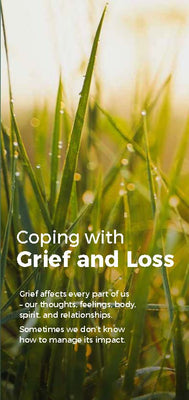Coping with grief and loss - HE2524

A pamphlet giving information about grief and loss. It suggests ways to cope or to help others to cope.
The full resource:
Grief affects every part of us – our thoughts, feelings, body, spirit, and relationships. Sometimes we don’t know how to manage its impact.
Grief affects us all
It’s normal to feel grief when we lose someone or something of value to us.
Dealing with grief changes us, and it can bring wisdom and insight. We can learn more about what really matters and what’s not so important.
We can feel grief when we lose:
- People – through death, a relationship break-up or because a relationship changes.
- Health – through illness or accident.
- Things we own – through accident, theft or disaster.
- Places – by moving schools, house, or city/country.
- Our place in the world – through being made redundant, losing a place on a team, changed roles or loss of self-identity.
- Pets – loss or death of a loved pet.
Feeling depressed
Sometimes grief can lead to depression.
You may:
- feel hopeless, angry, or miserable all the time
- find you don’t enjoy anything anymore
- have thoughts about death or harming yourself.
If you feel like this, it’s important to get professional help. (Refer to Where to go for help)
Feelings of grief
Grief can cause a range of different feelings and responses. These will come and go, and
you may only feel some of them.
- Shock/disbelief – You may feel in a daze, numb, empty. It can take a while for what has happened to sink in. You don’t want to believe it’s true.
- Sadness – You may want to cry. It helps to let these feelings out when you feel them, rather than pushing them away.
- Anger/blame/guilt – You may feel angry or want to blame yourself or others – perhaps even the person who has died. Recognising these feelings allows you to look for more positive ways to respond.
- Yearning – There may be a gap in your life. You understand that you can’t have things the way they were, but you may think about and long for the things you have lost.
- Helplessness – You may feel anxious because you suddenly have less control over your feelings – tears may spill out at any time. This will pass over time.
- Physical discomfort – You may feel unwell, have headaches or stomachaches, or get colds easily. You may feel tired a lot, or feel more or less hungry.
Be gentle on yourself.
Give yourself time. Take it easy.
Take time to grieve
- Stay connected. Talk to family, whānau, friends, or other people you trust about how you’re feeling.
- Write a letter to the person or thing you’ve lost. Include whatever you want – no one else ever has to see it. Write about the memories you treasure – the good, the bad, the funny, the sad and the things you will miss.
-
Be kind to yourself. Grieving can be exhausting. Doing something caring for yourself like listening to music, or going for a walk, may help.
Choose whatever suits you. If nothing seems to be helping, ask for support.
Helping a friend, family or whānau member who is grieving
It can be a help just to be around. Let the person who is grieving know that you
understand they are going through a hard time and you will be there if they want to
talk or just hang out. Talk to them about the ideas you’ve read in this booklet that might
help with their grief.
It can be helpful to offer practical support like cooking meals, helping with housework,
childcare, or accompanying the grieving person to meetings and appointments.
It’s okay to ask for support
Grief is a natural response to losing someone or something that is important to you. There is no right timeline to grieve, as everyone experiences grief differently. Letting
people know you need help, and accepting support when it’s offered, can lighten the load and be important when working through your grief.
If you are experiencing flashbacks or nightmares reliving what has happened, tell your doctor or counsellor or someone else that you trust.
There may be times you feel you just can’t cope and don’t know how you’re going to carry on, or if you want to. It will take time to come to terms with what has happened. Look back at the ideas suggested in the previous section. Maybe try another one or repeat one that worked last time you felt like this.
If over time you feel nothing is working and you can’t see a way through your grief, you may need professional support (like counselling).
Where to go for help
There are people and services available to provide or help you find extra support when you need it.
Most are free and have trained people who want to help. These include 24 hour helplines and websites:
- Need to talk? (Free call or text 1737)
- Lifeline 0800 543 354
- Alcohol & Drug Helpline 0800 787 797
- Youthline 0800 376 633 or free text 234
- thelowdown.co.nz (for young people, free text 5626)
- depression.org.nz (offers understanding, information, advice and stories of hope)
- smallsteps.org.nz (free online tools to manage your wellbeing)
- skylight.org.nz (grief, loss and trauma support and information)
- griefcentre.org.nz (support, advice and counselling)
- sands.org.nz (support for families who have experienced pregnancy, baby or infant loss)